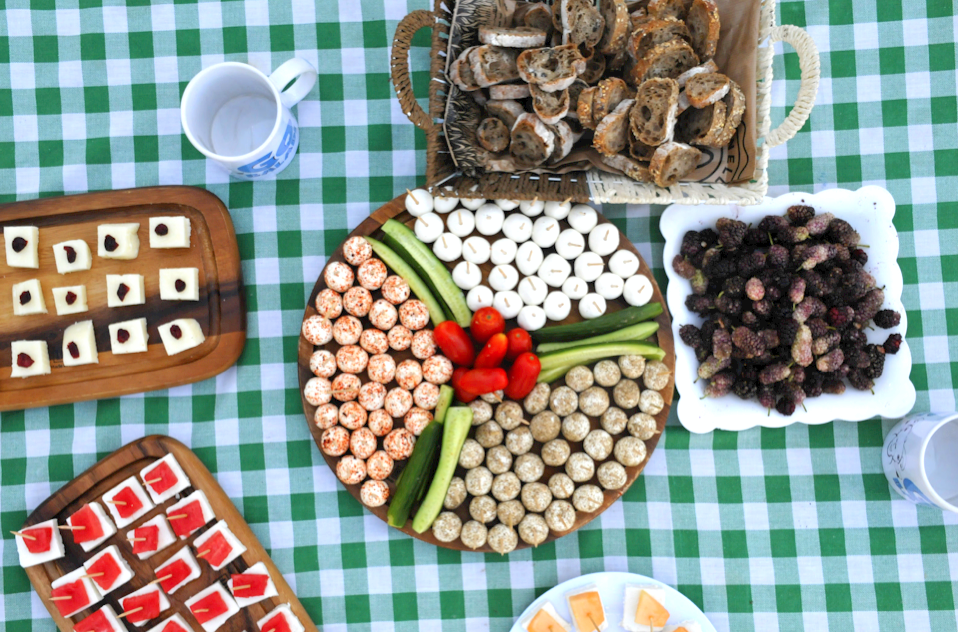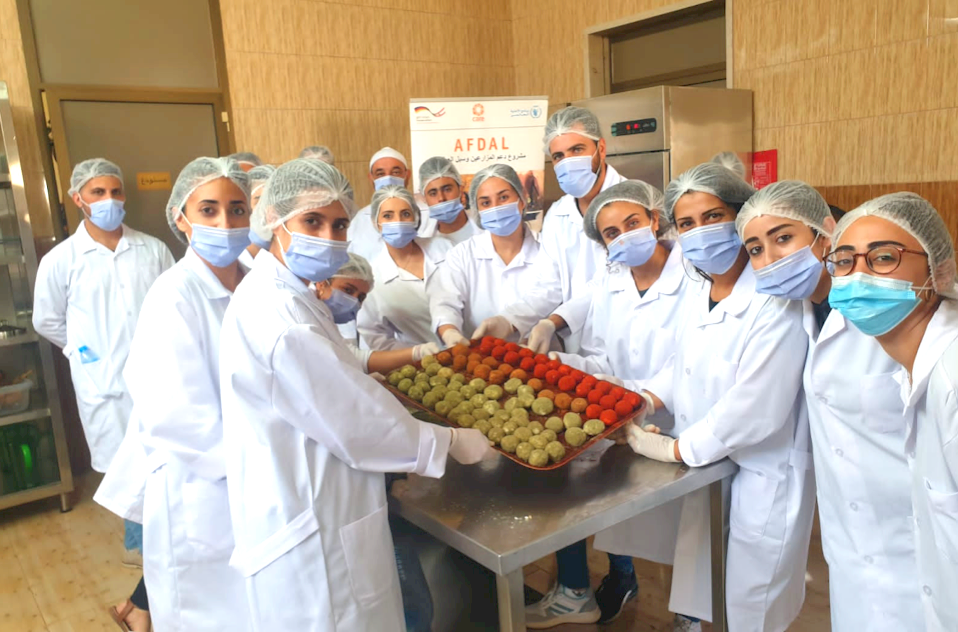
For International Day of Women and Girls in Science, WE4F invited Joelle Hajjar, Co-Founder and Operations Manager of our Lebanese innovator GO Baladi, to share her inspiring story on becoming a successful entrepreneur and leading figure in the Lebanese agri-food landscape.
JOELLE WHAT IS YOUR BACKGROUND AND WHAT MADE YOU DECIDE TO JOIN THE AGRICULTURAL FIELD?
Joelle: I am an agri-food engineer. I graduated from Saint Joseph University in Lebanon and also hold a Master’s in Food Security from Montpellier University. After graduating, I started working at our family business, GO Baladi. We primarily work with local shepherds, their families, and women, and do trainings with them [on hygiene, production, and animal welfare].
Growing up, my dad was my superhero. [Like me] he was an agri-food engineer and his dream was to have one of his children follow in his footsteps. My brother is an electrical engineer and my sister is a teacher, so I decided to pursue a career in agri-food. When starting out, I was worried about working in this field, but now I love it despite the challenges we face. There are so many opportunities, it’s an amazing sector. I always meet new people with new expertise and I learn a lot from them.
WHAT DO YOU LIKE THE MOST ABOUT BEING AN ENTREPRENEUR?
Joelle: I love managing everything and being my own boss. Sure, it can be challenging and stressful, and being an entrepreneur is not easy, but it is amazing for me. I had to learn about sales, production, quality control, marketing, and everything else, so I can now handle it together with my brother. I’m in charge of the operations, which was difficult for me at first, but now I’m getting used to it and enjoying it. I supervise all product testing, improvements and streamlining, staff management, and staff training.
In a family business, sometimes we have our own opinions and think differently, but since we are working jointly in one spirit, that is the most important thing – to grow the business. The business is our baby, and we all join hands to lift it up. I think my dad would be proud if he saw where we are today.
WHAT IS THE MOST CHALLENGING PART ABOUT YOUR PROFESSION AND BEING AN ENTREPRENEUR?
Joelle: Working with shepherds and [communicating] with the shepherds and our employees, who come from a different educational background than me, was the most difficult part. I had to work hard to convince them to adapt their way of thinking from a traditional way of doing things to the innovative methods of GO Baladi. For example, when it comes to hygiene control while making milk or supervising the quality of the nutrition for the animals, and everything related to that. Also, with our employees on the dairy farm, we had to work intensively on the food safety and process aspects. Now, we’re [improving] because we have a highly trained and well-prepared team with the skillsets we need! We’re now recruiting new employees, so we have to start from scratch, but it’s an exciting process.

HOW DOES BEING PART OF WE4F BENEFIT GO BALADI AND YOUR WORK?
Joelle: Currently we’re receiving energy efficiency technical assistance. [The support] improves our skills and adds for me, personally, new knowledge and new information that I didn’t know how to access before. Of course, I am very happy to be part of this community and appreciate the support from the RIH team (especially our country coordinator, Suha Hallab), because they play a big part in guiding us through the current crisis in Lebanon. This kind of support is very important.
One of the most important things I’ve learned was how to think in a different way when you are in a crisis, or when you face any kind of major problem. You should be optimistic and try to think [about] how you can benefit from this crisis positively. We shouldn’t think negatively despite all the hardships.
HOW DO YOU SEE GO BALADI GROWING IN THE FUTURE?
Joelle: I hope that we can grow as a business in the middle of this hard situation, and that we can also grow in the right direction to keep improving the situation and livelihoods for women, shepherds, and the Lebanese society – not only by making money and growing sales, but also seeing that we are making a positive impact on the environment and people. We especially want to uplift the young generation and empower those around us!


YOU’RE CLEARLY VERY PASSIONATE ABOUT AGRICULTURE AND NEW OPPORTUNITIES, SO IT’S NO SURPRISE YOU’RE VOLUNTEERING WITH THE AGRICULTURAL FARMERS DEVELOPMENT AND LIVELIHOODS PROJECT. CAN YOU TELL US MORE ABOUT YOUR VOLUNTEER WORK?
Joelle: [It’s] a project in [Southern] Lebanon that provides trainings for women [to] produce dairy products at home scale. Dairy and production processes [are] my field, and I love teaching people, but I am not a teacher by profession. So, this is a challenging opportunity for me – especially working with women with no background in this field. Since 2019, I have been going to the South to teach women how to produce laban, labneh, and other Lebanese – and even international – cheeses at home.
[We do] practical sessions on-site to show the women how to make cheese. We bring milk to a kitchen with all the needed equipment, we prepare and make cheeses and labneh, [then] we make the packaging and all the processes needed to transform the milk to a product that the women can sell. We even developed new products, such as halloumi stuffed with jam.
WHO ARE THE WOMEN AND WHY IS IT IMPORTANT TO YOU TO WORK WITH THEM?
Joelle: Most of the women I work with are housewives and stay-at-home moms, they have families and usually do not work. By learning about cheesemaking, they can learn something new to empower themselves in society. Eight of them already opened their own businesses and started working at home, selling in exhibitions, in some shops in the South and in their neighborhoods. I still talk to them often – they call me for my advice about pricing, packaging, and social media marketing on Instagram. Seeing the results in front of me is very encouraging and we get lots of positive feedback. It’s not just a training and then it’s over, we all really enjoy it and learn from it.

SPEAKING OF ADVICE, WHAT WOULD YOU RECOMMEND TO YOUNG GIRLS CONSIDERING A CAREER IN SCIENCE?
Joelle: Try to get work experience. Learning from experience is the most important thing in life. The theoretical part is important, but not enough. You need to work and discover new techniques, new technologies. Also, I would encourage everybody to share information with other people who will really appreciate it! [S]hare your knowledge and pass on what you learned in real life, especially in science. Sometimes people in science don’t like to share their discoveries with others, and this is not correct. Always share your knowledge so everybody can benefit and you will have a good impact on society.
WHAT HAS BEEN YOUR EXPERIENCE AS A WOMAN IN SCIENCE AND BUSINESS?
Joelle: I think it’s something positive. If you’re a woman in this field, people will perceive you in a different way. Of course, experiences may vary, but my experience is that people are more considerate in how they treat you to show respect. Especially when working with shepherds, it has been extremely positive for me. I really hope more women and girls are encouraged to enter this field! In fact, I feel that more women and girls are getting into the sciences. At university, in the agricultural faculty where I did my degree, you now see that more than half of the students are women. This is really cool. Before, agricultural engineering was only for men. Now it’s totally different. It’s very empowering!

GO Baladi has been part of the WE4F MENA innovator cohort since 2021 and caters to both the Lebanese as well as the regional market (currently United Arab Emirates and Kuwait, with plans to expand further). The company works directly with local shepherds to produce a wide range of high-quality goat milk products, while ensuring strict environmental and animal welfare standards.

